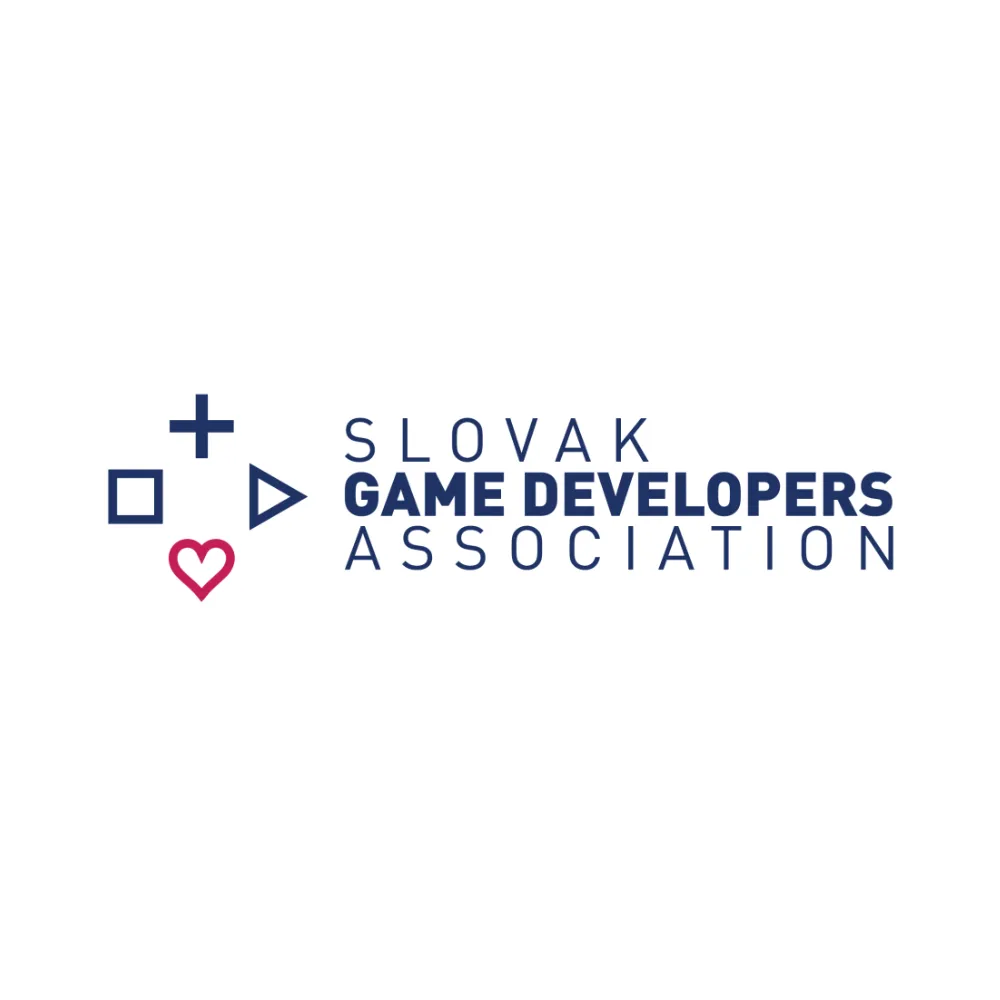BRIDGING RESEARCH, TECHNOLOGY, AND THE GAMING WORLD
Your partner in cutting-edge software development
Our mission is to transform human well-being and human-computer interaction. We do this by integrating virtual reality, augmented reality, and artificial intelligence technologies. At the heart of our philosophy is game-therapy. We create innovative, scientifically grounded, yet playful solutions for a wide range of challenges.
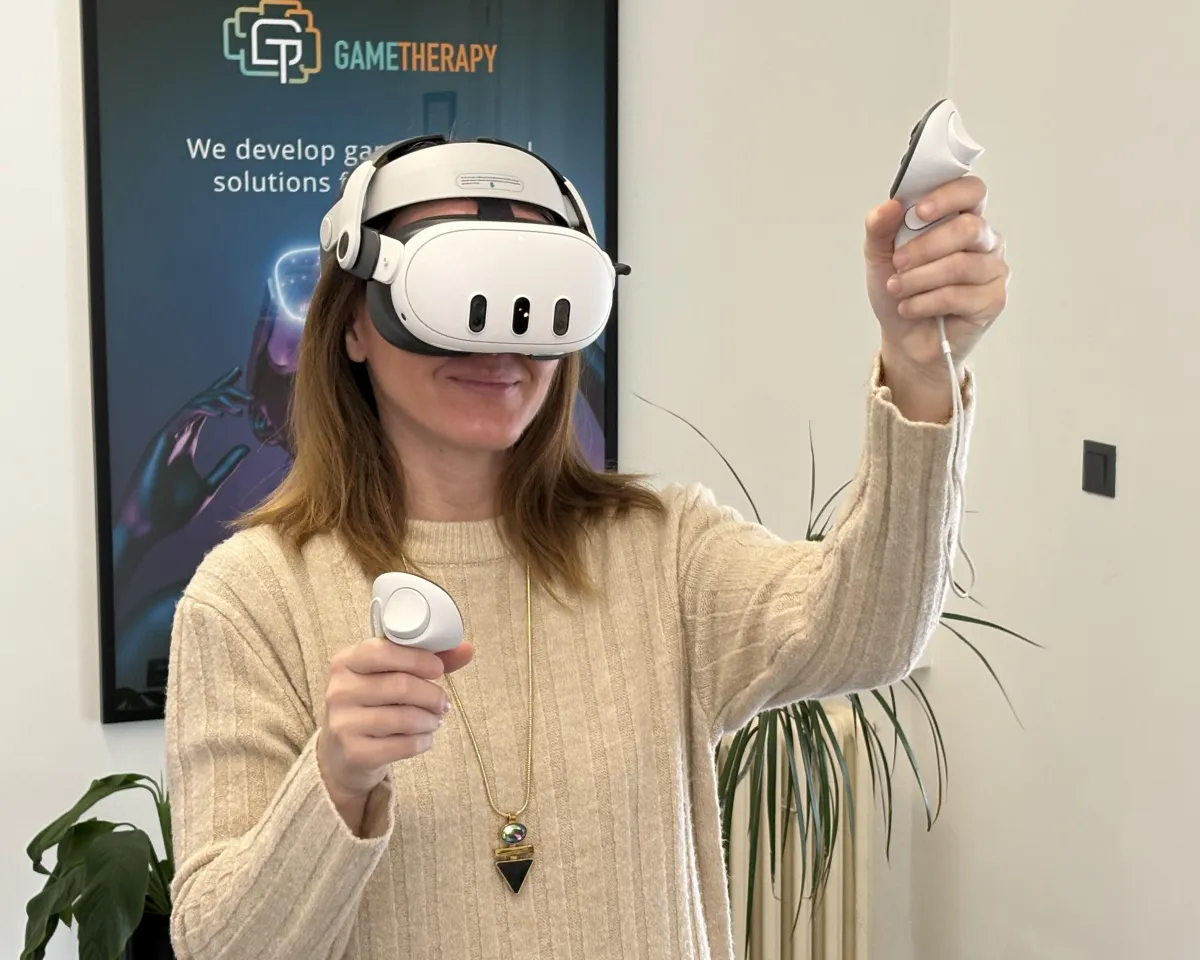
IMPACTFUL TOOLS FOR A BETTER QUALITY OF LIFE
Our products
ClaustrOFF
A game created with cutting-edge research to help you overcome fears in a safe, engaging, and effective way
NeuroBoostVR
Innovative exercises for seniors and others to improve motor skills, balance, and orientation with simple, effective activities
VIRADIA
Virtual Reality Platform for Early Diagnosis of Neurodegenerative Diseases, Revolutionizing Neurological Diagnostics
Experience the full power of VR for positive well-being
With a commitment to innovation and the transformative power of VR, we aim to make a lasting impact on mental health, education, industry, and personal growth, all grounded in scientific research and designed to enhance well-being worldwide.
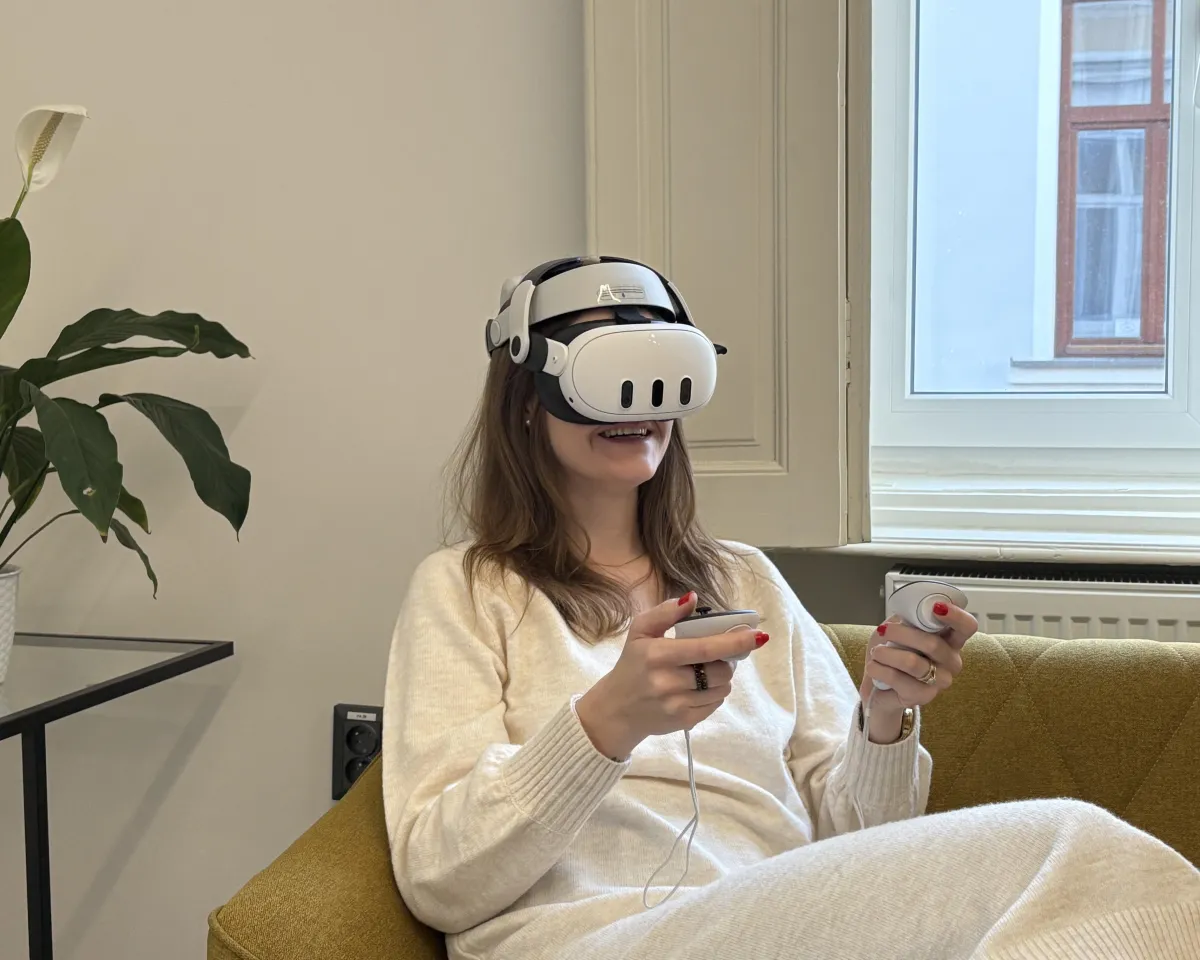
GROWTH THROUGH INNOVATIONS
The GAMETHERAPY model
We harness the power of new technologies. By making care and training more accessible and tailored, we empower individuals and organizations to thrive. Rooted in scientific research, our innovative approach drives meaningful change, transforming mental health, education, healthcare, industry, and personal growth on a global scale.
SOLUTIONS THAT MAKE AN IMPACT
Immersive solutions for mental health and beyond
Our primary focus is on creating immersive applications that empower individuals to overcome challenges like anxiety, phobias, and neurological conditions. These solutions are designed to enhance well-being and unlock potential across various aspects of life, showcasing our expertise in innovative and impactful technologies.
Engaging VR/AR solutions for soft skills training
Evaluation in neurology and rehabilitation
General education
Personal development
Industrial training
Industry 5.0 applications
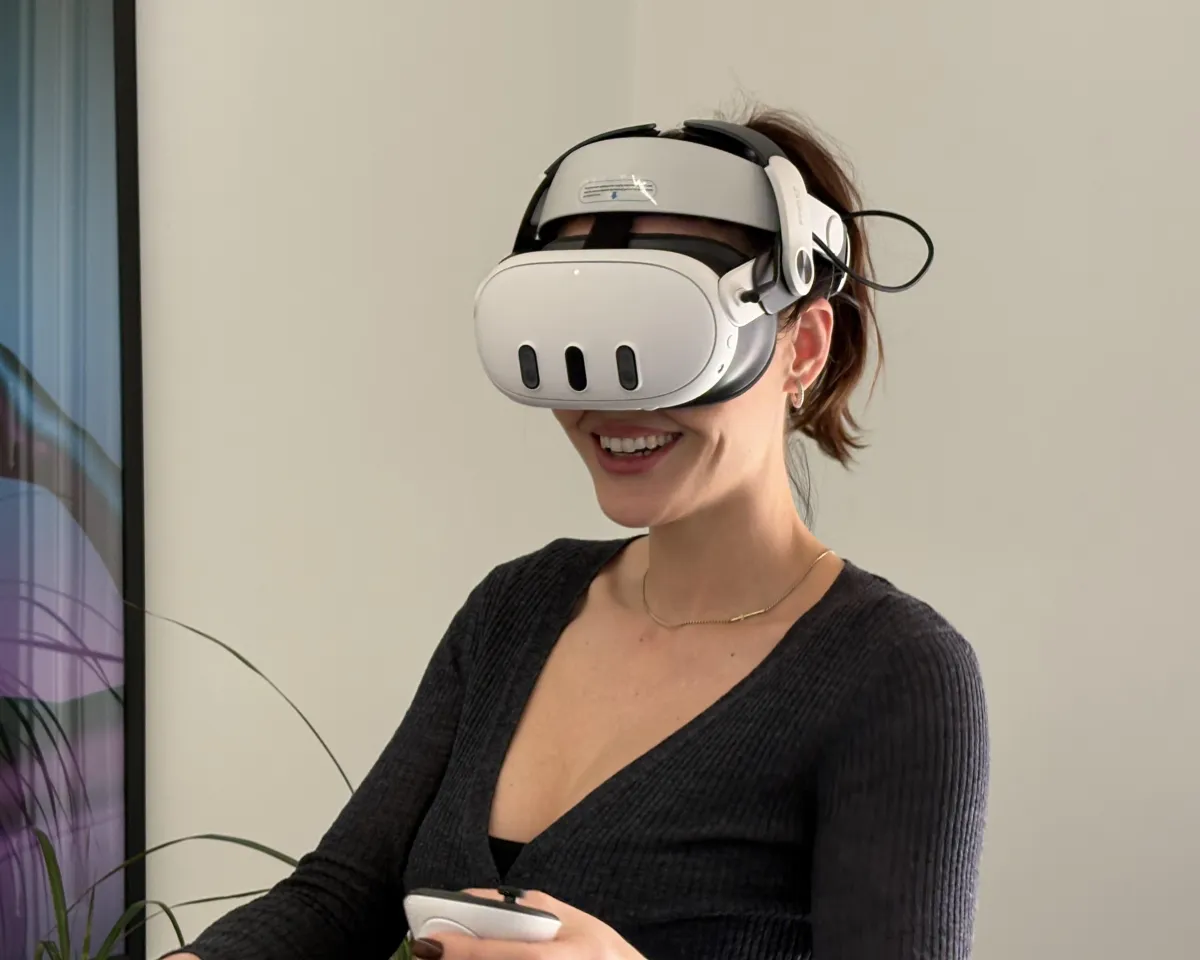
Join the Mind Heaven Community!
Be part of our journey to transform mental health care and well-being through innovation and gamification. By signing up, you’ll gain access to exclusive psychological content, enjoy discounts on our products, and stay updated with the latest news about our projects. You’ll also discover unique content like game stories and behind-the-scenes insights into our app development process. We value your ideas and feedback to make our games even better. Join us, become a co-creator, and help shape the future of the Mind Heaven Community!
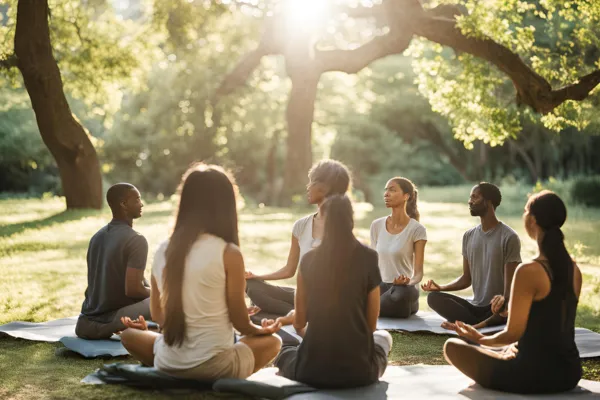
Mindfulness Practices to Reduce Anxiety in Daily Life
Mindfulness Practices to Reduce Anxiety in Daily Life

"Mindfulness is not about stopping your thoughts but learning to observe them without judgment. This simple shift can turn chaos into calm." – Dr. Martin Polák
Anxiety can feel overwhelming, but practicing mindfulness offers a powerful way to manage it. Mindfulness helps you focus on the present moment, reducing feelings of worry and stress. With consistent practice, it can transform how you respond to anxiety in your daily life. In this article, we’ll explore scientifically-backed mindfulness techniques to help you find calm and balance.
What is Mindfulness?
Mindfulness is the practice of being fully present and aware of your thoughts, feelings, and surroundings without judgment. Instead of getting lost in worries about the past or future, mindfulness trains your brain to focus on the "now." Research shows that regular mindfulness practice can lower cortisol (the stress hormone), improve emotional regulation, and enhance overall mental well-being.
Why Mindfulness Reduces Anxiety
Anxiety often stems from worrying about what might happen, causing your mind to race with "what-ifs." Mindfulness interrupts this cycle by:
Grounding you in the present moment.
Shifting your focus from fear to awareness.
Teaching you to accept thoughts and feelings without reacting to them.
Studies published in The Journal of Anxiety, Stress, and Coping reveal that mindfulness reduces anxiety symptoms by promoting relaxation and emotional resilience.
Top Mindfulness Practices for Anxiety Relief
1. Mindful Breathing
Mindful breathing is one of the simplest and most effective ways to reduce anxiety.
How to do it: Sit comfortably, close your eyes, and take slow, deep breaths. Focus on the sensation of air entering and leaving your body.
Why it works: Breathing activates your parasympathetic nervous system, calming your body and mind.
2. Body Scan Meditation
This practice helps you release physical tension often caused by anxiety.
How to do it: Lie down or sit in a quiet space. Close your eyes and focus on each part of your body, starting at your toes and moving upward. Notice any tension and imagine it melting away.
Why it works: It brings awareness to your physical sensations, encouraging relaxation and grounding.
3. Grounding Exercises
Grounding helps redirect your focus from anxious thoughts to the present.
How to do it: Use the 5-4-3-2-1 method: Identify 5 things you see, 4 things you can touch, 3 things you hear, 2 things you smell, and 1 thing you taste.
Why it works: It shifts your attention away from anxiety and anchors you in the present moment.
4. Gratitude Journaling
Gratitude shifts your mindset from fear to appreciation.
How to do it: Each day, write down three things you’re grateful for. Be specific, and reflect on why they matter to you.
Why it works: Focusing on positive aspects of life reduces the impact of negative thoughts.
5. Mindful Walking
Mindful walking combines movement and mindfulness for a calming effect.
How to do it: Walk slowly and deliberately, focusing on each step. Notice how your feet feel as they touch the ground and the rhythm of your breath as you move.
Why it works: It connects your body and mind, helping you stay present.
6. Labeling Thoughts
This technique involves identifying and naming your thoughts without judgment.
How to do it: When anxious thoughts arise, label them ("worrying," "planning," "criticizing") and let them pass.
Why it works: Labeling creates distance from your thoughts, reducing their emotional intensity.
How to Make Mindfulness a Daily Habit
Start Small: Begin with 5 minutes a day and gradually increase the duration.
Incorporate It Into Routine: Practice mindfulness during daily activities like eating, walking, or brushing your teeth.
Use Reminders: Set alarms or leave sticky notes to remind yourself to stay present.
Join a Group: Consider joining a mindfulness class or app for guidance and motivation.
The Science Behind Mindfulness and Anxiety
Numerous studies confirm the effectiveness of mindfulness in reducing anxiety.
Clinical Psychology Review (2021): Found that mindfulness-based interventions significantly decrease anxiety symptoms across various populations.
JAMA Internal Medicine (2020): Reported that mindfulness meditation improves anxiety, depression, and overall psychological well-being.
Journal of Anxiety, Stress, and Coping (2019): Highlighted that mindfulness reduces the reactivity of the amygdala, the brain’s fear center, during stressful events.
Final Thoughts
Mindfulness is a powerful tool to reduce anxiety and create a sense of calm in your daily life. By practicing techniques like mindful breathing, grounding exercises, and gratitude journaling, you can train your mind to focus on the present and manage anxious thoughts more effectively. Start small, stay consistent, and remember that every moment of mindfulness is a step toward greater peace and resilience.
References
Kabat-Zinn, J. (2020). Mindfulness for Beginners: Reclaiming the Present Moment—and Your Life. Hachette Books.
Hofmann, S. G., & Gomez, A. F. (2021). Mindfulness-Based Interventions for Anxiety and Depression. Clinical Psychology Review.
Goyal, M., et al. (2020). Meditation programs for psychological stress and well-being. JAMA Internal Medicine.
Brewer, J. A., & Roy, A. (2022). Mindfulness training for anxiety: Evidence and mechanisms. Journal of Anxiety Disorders.




